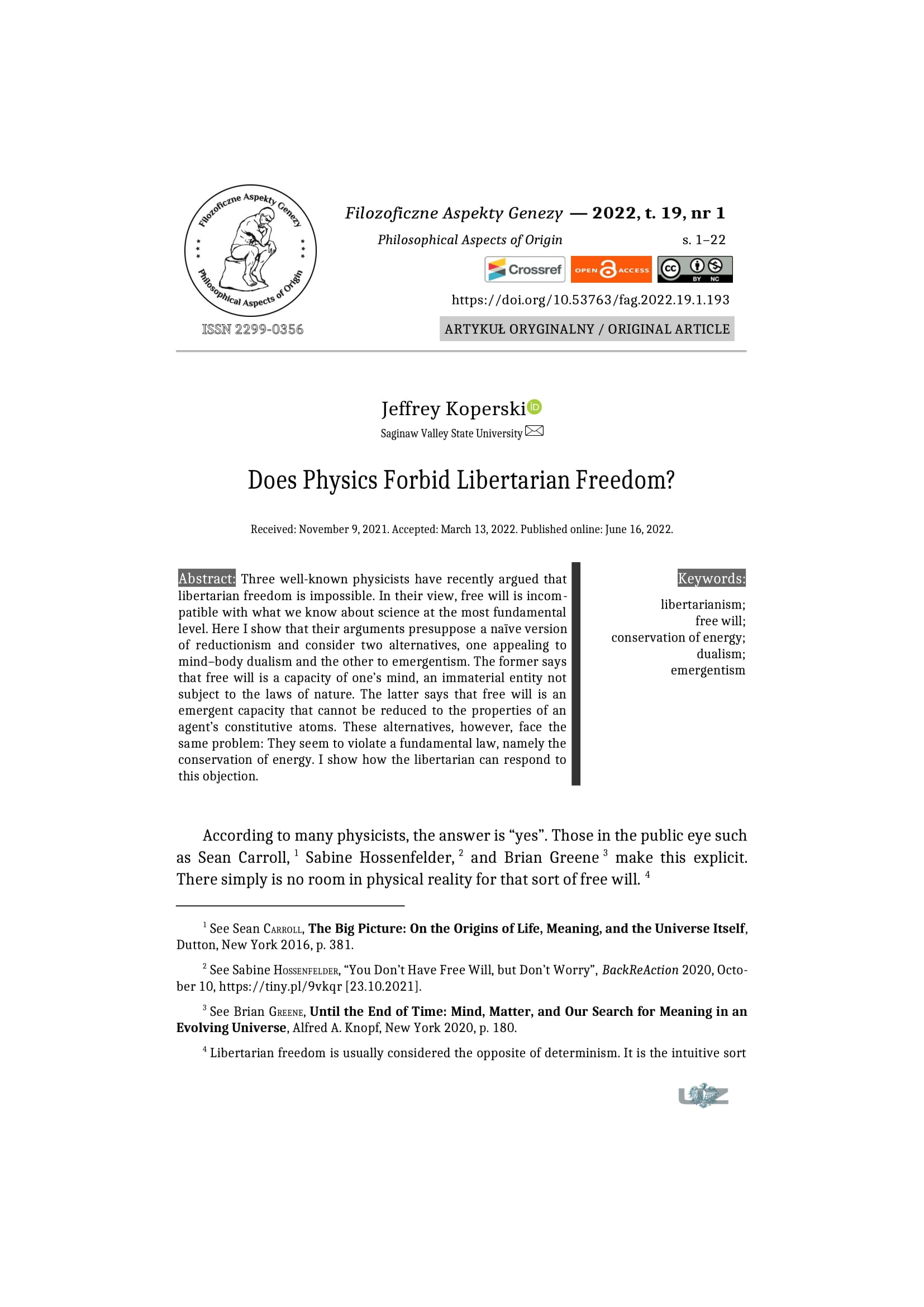
Opublikowane 16.06.2022
Wersje
- 18.08.2022 - (2)
- 16.06.2022 - (1)
Słowa kluczowe
- libertarianism,
- free will,
- conservation of energy,
- dualism,
- emergentism
Prawa autorskie (c) 2022 Filozoficzne Aspekty Genezy

Utwór dostępny jest na licencji Creative Commons Uznanie autorstwa – Użycie niekomercyjne 4.0 Międzynarodowe.
Jak cytować
Abstrakt
Three well-known physicists have recently argued that libertarian freedom is impossible. In their view, free will is incompatible with what we know about science at the most fundamental level. Here I show that their arguments presuppose a naïve version of reductionism and consider two alternatives, one appealing to mind–body dualism and the other to emergentism. The former says that free will is a capacity of one’s mind, an immaterial entity not subject to the laws of nature. The latter says that free will is an emergent capacity that cannot be reduced to the properties of an agent’s constitutive atoms. These alternatives, however, face the same problem: They seem to violate a fundamental law, namely the conservation of energy. I show how the libertarian can respond to this objection.
Downloads
Bibliografia
- Aguirre Anthony, Foster Brendan, and Merali Zeeya (eds.), What Is Fundamental?, The Frontiers Collection, Springer International Publishing, Cham 2019.
- Ahnert Thomas, Soul and Mind, in: Garrett (ed.), The Routledge Companion to Eighteenth Century Philosophy…, pp. 297–319.
- Austin Christopher J., Marmodoro Anna, and Roselli Andrea (eds.), Powers, Time and Free Will, Springer International Publishing, Cham 2022.
- Bishop Robert C., The Physics of Emergence, IOP Concise Physics, San Rafael 2019.
- Bishop Robert C. and Ellis George F.R., Contextual Emergence of Physical Properties, Foundations of Physics 2020, Vol. 50, No. 5, pp. 481–510, https://doi.org/10.1007/s10701-020-00333-9.
- Bradley Robert E. and Sandifer Charles Edward (eds.), Leonhard Euler: Life, Work, and Legacy, Studies in the History and Philosophy of Mathematics, Vol. 5, Elsevier, Amsterdam 2008.
- Breidert Wolfgang, Leonhard Euler and Philosophy, in: Bradley and Sandifer (eds.), Leonhard Euler…, pp. 97–108.
- Butterfield Jeremy, Laws, Causation and Dynamics at Different Levels, Interface Focus 2012, Vol. 2, No. 1, pp. 101–114, https://doi.org/10.1098/rsfs.2011.0052.
- Butterfield Jeremy, Quantum Curiosities of Psychophysics, in: Cornwell (ed.), Consciousness and Human Identity…, pp. 122–159.
- Carroll Sean, Energy Is Not Conserved, Preposterous Universe 2010, February 22, https://tiny.pl/9vk3b [23.10.2021].
- Carroll Sean, Spacetime and Geometry: An Introduction to General Relativity, Cambridge University Press, New York 2019.
- Carroll Sean, The Biggest Ideas in the Universe, Vol. 21: Emergence, 2020, August 11, https://tiny.pl/9vkm9 [23.10.2021].
- Carroll Sean, The Big Picture: On the Origins of Life, Meaning, and the Universe Itself, Dutton, New York 2016.
- Cornwell John (ed.), Consciousness and Human Identity, Oxford University Press, New York 1998.
- Crowell Benjamin, General Relativity, Fullerton College, Fullerton 2022, https://tiny.pl/9vkbs [23.10.2021].
- Cucu Alin and Pitts J. Brian, How Dualists Should (Not) Respond to the Objection from Energy Conservation, Mind and Matter 2019, Vol. 17, No. 1, pp. 95–121.
- Dennett Daniel, Consciousness Explained, Little, Brown and Co., Boston 1991.
- Fales Evan, Divine Intervention: Metaphysical and Epistemological Puzzles, Taylor & Francis, New York 2010.
- Fales Evan, It Is Not Reasonable to Believe in Miracles, in: Moreland, Meister, and Sweis (eds.), Debating Christian Theism…, pp. 298–310.
- Gao Shan, The Meaning of the Wave Function: In Search of the Ontology of Quantum Mechanics, Cambridge University Press, Cambridge 2017.
- Garrett Aaron (ed.), The Routledge Companion to Eighteenth Century Philosophy, Routledge Philosophy Companions, Routledge, London 2014.
- Goldstein Sheldon, Bohmian Mechanics, in: Zalta (ed.), The Stanford Encyclopedia of Philosophy, Summer 2017…, https://tiny.pl/9vkx7 [23.10.2021].
- Greene Brian, Until the End of Time: Mind, Matter, and Our Search for Meaning in an Evolving Universe, Alfred A. Knopf, New York 2020.
- Halvorson Hans, Plantinga on Providence and Physics, European Journal for Philosophy of Religion 2013, Vol. 5, No. 3, pp. 19–30, https://doi.org/10.24204/ejpr.v5i3.216.
- Hossenfelder Sabine, You Don’t Have Free Will, but Don’t Worry, BackReAction 2020, October 10, https://tiny.pl/9vkqr [23.10.2021].
- Hossenfelder Sabine, 10 Physics Facts You Should Have Learned in School but Probably Didn’t, BackReAction 2018, July 30, https://tiny.pl/9vkb7 [23.10.2021].
- Hossenfelder Sabine, The Case for Strong Emergence, in: Aguirre, Foster, and Merali (eds.), What Is Fundamental…, pp. 85–94, https://doi.org/10.1007/978-3-030-11301-8_9.
- Jaffe Robert L. and Taylor Washington, The Physics of Energy, Cambridge University Press, Cambridge — New York 2018.
- Koperski Jeffrey, Divine Action, Determinism, and the Laws of Nature, Routledge, New York 2020, https://doi.org/10.4324/9780429029110.
- Ladyman James and Ross Don, Every Thing Must Go: Metaphysics Naturalized, Oxford University Press, Oxford 2007.
- Lowe E.J., Personal Agency: The Metaphysics of Mind and Action, Oxford University Press, Oxford 2010.
- Marion Jerry B. and Thornton Stephen T., Classical Dynamics of Particles & Systems, 3rd ed., Harcourt Brace Jovanovich, San Diego 1988.
- Maudlin Tim, Okon Elias, and Sudarsky Daniel, “On the Status of Conservation Laws in Physics: Implications for Semiclassical Gravity, Studies in History and Philosophy of Science Part B: Studies in History and Philosophy of Modern Physics 2020, Vol. 69, pp. 67–81, https://doi.org/10.1016/j.shpsb.2019.10.004.
- McLaughlin Brian P., Beckermann Ansgar, and Walter Sven (eds.), The Oxford Handbook of Philosophy of Mind, Oxford University Press, New York 2009.
- Milgrom Mordehai, MOND vs. Dark Matter in Light of Historical Parallels, Studies in History and Philosophy of Science Part B: Studies in History and Philosophy of Modern Physics 2020, Vol. 71, No. 4, pp. 170–195, https://doi.org/10.1016/j.shpsb.2020.02.004.
- Moreland J.P., Meister Chad, and Sweis Khaldoun A. (eds.), Debating Christian Theism, Oxford University Press, New York 2013.
- O’Connor Timothy, Emergent Properties, in: Zalta (ed.), The Stanford Encyclopedia of Philosophy, Fall 2020…, https://tiny.pl/9vkns [23.10.2021].
- O’Connor Timothy and Franklin Christopher, Free Will, in: Zalta (ed.), The Stanford Encyclopedia of Philosophy, Spring 2021…, https://tiny.pl/9vkqp [23.10.2021].
- Paolini Paoletti Michele and Orilia Francesco (eds.), Philosophical and Scientific Perspectives on Downward Causation, Routledge Studies in Contemporary Philosophy, Vol. 91, Routledge, New York 2017.
- Papineau David, The Causal Closure of the Physical and Naturalism, in: McLaughlin, Beckermann, and Walter (eds.), The Oxford Handbook of Philosophy of Mind…, pp. 53–65.
- Pereboom Derk, Free Will, Elements in Philosophy of Mind, Cambridge University Press, Cambridge 2022, https://doi.org/10.1017/9781108982511.
- Pitts J. Brian, Conservation Laws and the Philosophy of Mind: Opening the Black Box, Finding a Mirror, Philosophia 2019, Vol. 48, pp. 673–707, https://doi.org/10.1007/s11406-019-00102-7.
- Pitts J. Brian, Conservation of Energy: Missing Features in Its Nature and Justification and Why They Matter, Foundations of Science 2021, Vol. 26, No. 3, pp. 559–584, https://doi.org/10.1007/s10699-020-09657-1.
- Pitts J. Brian, General Relativity, Mental Causation, and Energy Conservation, Erkenntnis 2020, https://doi.org/10.1007/s10670-020-00284-7.
- Plantinga Alvin, Materialism and Christian Belief, in: Van Inwagen and Zimmerman (eds.), Persons Human and Divine…, pp. 99–141.
- Routledge Encyclopedia of Philosophy, 1st ed., Routledge, London 2016.
- Saunders Simon, Many Worlds? An Introduction, in: Saunders, Barrett, Kent, and Wallace (eds.), Many Worlds…, pp. 1–49.
- Saunders Simon, Barrett Jonathan, Kent Adrian, and Wallace David (eds.), Many Worlds?: Everett, Quantum Theory, and Reality, Oxford University Press, Oxford 2010.
- Searle John R., Mind: A Brief Introduction, Fundamentals of Philosophy Series, Oxford University Press, New York 2004.
- Simpson William M.R. and Horsley Simon A.R., Toppling the Pyramids: Physics Without Physical State Monism, in: Austin, Marmodoro, and Roselli (eds.), Powers, Time and Free Will…, pp. 17–50, https://doi.org/10.1007/978-3-030-92486-7_2.
- Sklar Lawrence, Philosophy of Physics, Dimensions of Philosophy Series, Westview Press, Boulder 1992.
- Tabor Michael, Chaos and Integrability in Nonlinear Dynamics: An Introduction, Wiley, New York 1989.
- Timpe Kevin, Free Will: Sourcehood and Its Alternatives, 2nd ed., Continuum, New York 2012.
- Van Inwagen Peter and Zimmerman Dean W. (eds.), Persons Human and Divine, Oxford University Press, New York 2007.
- Voosholz Jan and Gabriel Markus (eds.), Top-down Causation and Emergence, Synthese Library, Vol. 439, Springer, Berlin 2021.
- Wald Robert M., General Relativity, University of Chicago Press, Chicago 1984.
- Wallace David, The Emergent Multiverse: Quantum Theory According to the Everett Interpretation, Oxford University Press, Oxford 2012.
- Wilson Jessica M., Metaphysical Emergence, Oxford University Press, Oxford 2021.
- Wilson Mark, Mechanics, Classical, in: Routledge Encyclopedia of Philosophy…, https://doi.org/10.4324/9780415249126-Q068-1.
- Zalta Edward N. (ed.), The Stanford Encyclopedia of Philosophy, Fall 2020 (Metaphysics Research Lab, Stanford University, 2020).
- Zalta Edward N. (ed.), The Stanford Encyclopedia of Philosophy, Spring 2021 (Metaphysics Research Lab, Stanford University, 2021).
- Zalta Edward N. (ed.), The Stanford Encyclopedia of Philosophy, Summer 2017 (Metaphysics Research Lab, Stanford University, 2017).


